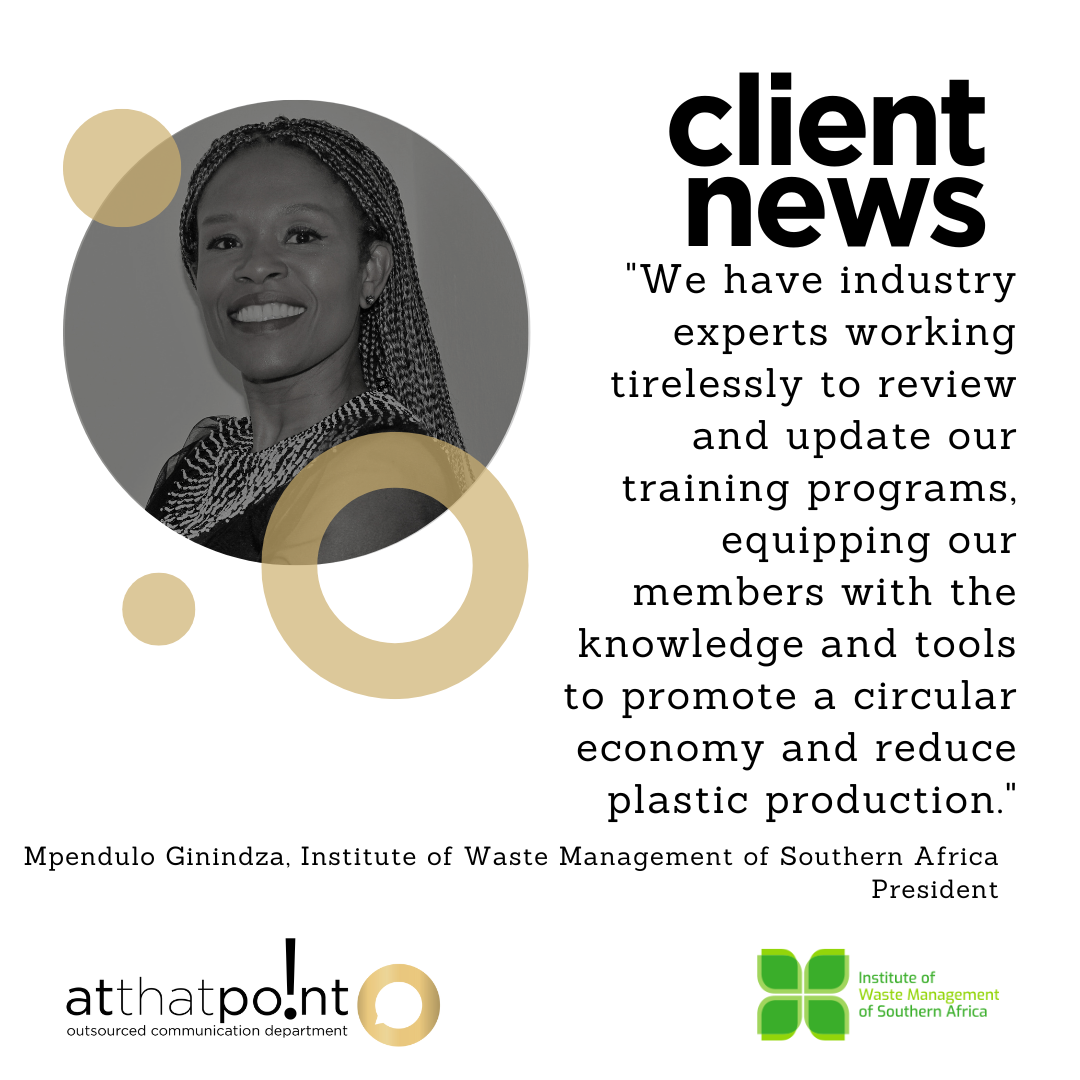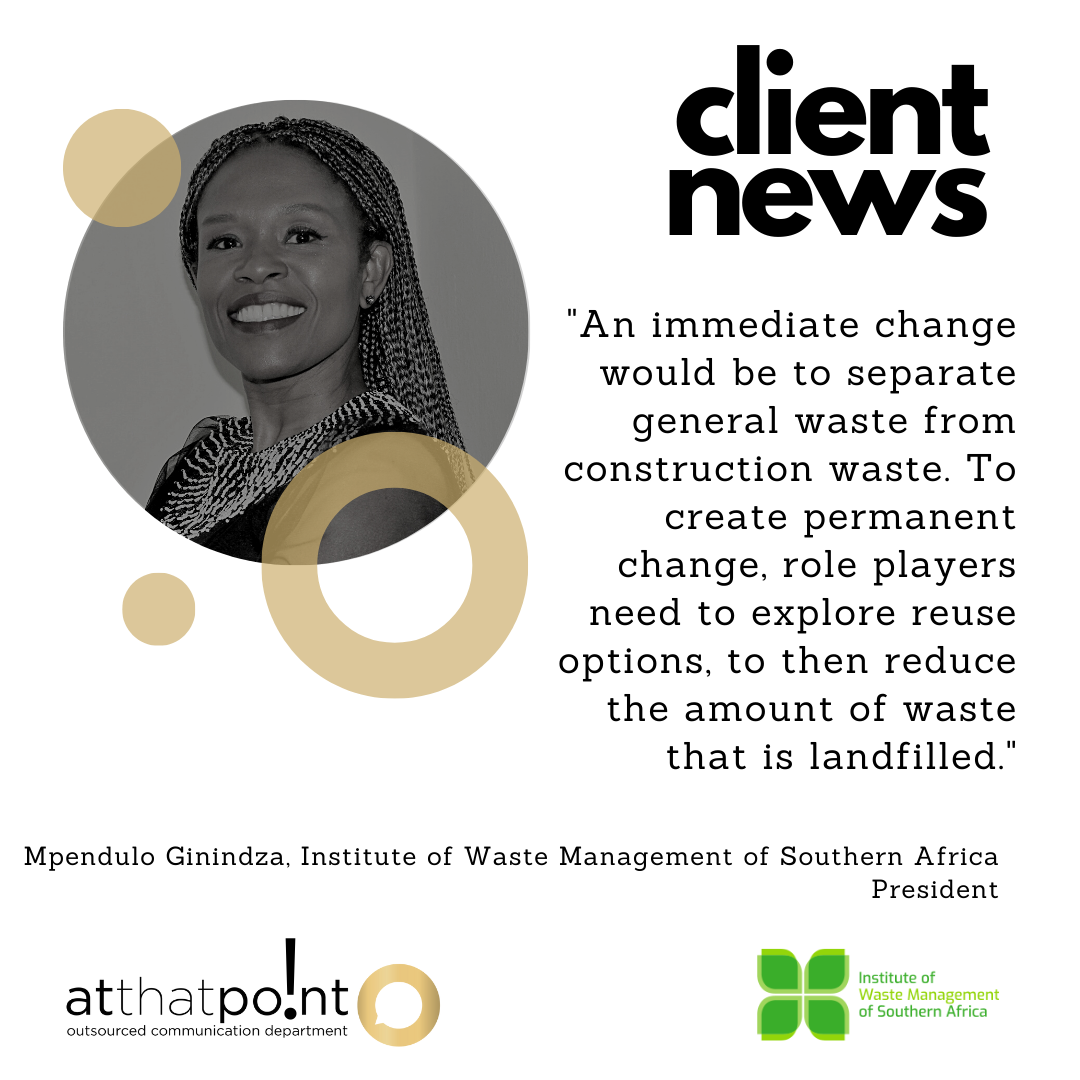 This World Earth Day April 22, 2024, the Institute of Waste Management of Southern Africa (IWMSA) underscores the critical need for concerted efforts to combat plastic pollution, a pressing environmental challenge in South Africa. This year's theme, "Planet vs. Plastics," resonates deeply with the ongoing battle against plastic pollution in our country, emphasising the urgency of transitioning towards sustainable waste management practices and reducing plastic production. According to Mpendulo Ginindza, President of the IWMSA, "The plastic economy in South Africa is based on a linear model of take-make-waste, leading to significant environmental consequences. Improper waste management results in plastic waste infiltrating our rivers, oceans, and communities, posing threats to wildlife and ecosystems.” She says that even seemingly sustainable solutions need to be rethought when it comes to how we handle waste management. According to the Ewastemonitorinfo.org’s new report, The global E-waste Monitor 2024, the green transition and the connecting of off-grid communities will lead to a quadrupling of waste from photovoltaic panels from 0.6 billion kg in 2022 to 2.4 billion kg in 2030. “Small equipment, such as video cameras, toys, microwave ovens and e-cigarettes, also constitutes the largest category of e-waste in terms of mass, accounting for 20 billion kg in 2022, or almost one-third of the world’s total e-waste,” says Ginindza. In alignment with World Earth Day's "Planet vs. Plastics" theme, the IWMSA is devoted to raising awareness about the detrimental impacts of plastic pollution and promoting sustainable solutions to address this pressing issue. Through initiatives such as community clean-ups and educational campaigns, the IWMSA aims to empower individuals, businesses, and government agencies to take proactive steps towards reducing plastic consumption and promoting a circular economy. "We have industry experts working tirelessly to review and update our training programs, equipping our members with the knowledge and tools to promote a circular economy and reduce plastic production," says Ginindza. Collaboration Among Government Agencies, Businesses, and Individuals is needed The IWMSA acknowledges the importance of collaboration among government agencies, businesses, and individuals in tackling plastic pollution and promoting sustainable waste management practices. Through strategic partnerships and collaborative initiatives, the IWMSA wants to harness collective efforts towards achieving the ambitious goal of reducing plastic production by 60% by 2040. “As a member driven organisation, we require participation of members so that we can effectively engage stakeholders. IWMSA has MOUs with strategic partners, these include the DFFE, various universities and NGOs, and industries that support our vision. If we are to achieve the 2040 targets, we must work together. It requires collaboration and participation,” says Ginindza. Despite facing challenges in achieving this target, including the need for increased member participation and stakeholder engagement, the IWMSA remains steadfast in its commitment to driving progress towards a sustainable future. Success stories, such as the development of professionals through IWMSA programs, underscore the organisation's impact in promoting environmental stewardship and responsible waste management practices. Building on this commitment, the International Solid Waste Association (ISWA), played a key role at the first session of the Intergovernmental Negotiating Committee (INC-1) on Plastic Pollution. The meeting, held in Punta del Este, Uruguay from November 28 to December 2, 2022, focused on addressing the severe issue of plastic pollution as part of a wider environmental crisis. During the session, ISWA engaged with various stakeholders and member states, advocating for the development of an international legally binding agreement to combat plastic pollution effectively. The IWMSA has shared ISWA’s recommendations with the Department of Forestry, Fisheries and the Environment who are the National Focal Point. ISWA’s contribution, crafted with insights from its Science and Technical Committee and finalised by a Task Force coordinating committee, is now available on the United Nations Environment Programme website. Consumer Education and Empowerment Key to Fostering Sustainable Consumption Habits As consumers play a crucial role in addressing the plastic pollution crisis, the IWMSA emphasises the importance of consumer education and empowerment in fostering sustainable consumption habits. By making informed choices and supporting initiatives that promote waste management and recycling, individuals can contribute to the shift towards a circular economy. “Looking ahead, the IWMSA's priorities include advancing its mission of promoting responsible waste management and environmental stewardship in South Africa, with a focus on driving the transition towards a circular economy and creating value from secondary resources to support job creation and economic growth,” concludes Ginindza. ENDS MEDIA CONTACT: Idele Prinsloo, [email protected], 082 573 9219 www.atthatpoint.co.za For more information on IWMSA please visit: Website: Home (iwmsa.co.za) X: @IWMSA LinkedIn: Institute of Waste Management of Southern Africa Facebook: Institute of Waste Management of Southern Africa
0 Comments
 Whether you're a corporate event planner or a parent hosting a family party this Easter Weekend, you'll probably have your hands full with planning and preparations. "This year, it's equally important to work waste management into your do," says Mpendulo Ginindza, President of the Institute of Waste Management of Southern Africa (IWMSA). Countrywide Easter events can put a huge strain on the national waste management infrastructure and that's bad news for the environment. So, let’s commit to doing things differently this time around. Planning a Zero Waste event Planning for waste management means having the right mindset. You can be a waste-free event pro by following these guidelines from Mpendulo:
Extra tips
This Easter bash is going to be your best one yet, all because of your waste management skills. That's extra cause for celebration. "The IWMSA thanks you for your efforts and wishes all South Africans a happy, safe and waste-free Easter," says Mpendulo. ENDS MEDIA CONTACT: Idele Prinsloo, [email protected], 082 573 9219, www.atthatpoint.co.za For more information on IWMSA please visit: Website: Home (iwmsa.co.za) Twitter: @IWMSA LinkedIn: Institute of Waste Management of Southern Africa Facebook: Institute of Waste Management of Southern Africa Every industry suffers its fair share of myths, and waste management is no different.
"We need to separate the truth from the half-truths and nonsense that can hinder our progress towards a waste-free society," says Mpendulo Ginindza, President of the Institute of Waste Management of Southern Africa. Here are her 10 top myths about waste management. Myth 1: Waste Management is only about garbage disposal How to dispose of one's garbage is just a small part of waste management, a complex discipline that reaches across industries and national borders. It embraces strategies for ethical, sustainable and responsible product development, manufacture, consumption and disposal, including the destruction, storage, recycling or reusability of waste. Myth 2: Waste management is solely the government's responsibility Waste management is, in fact, the responsibility of everyone who generates waste, including households, retailers and, under recent legislation, product manufacturers. They are assisted by the waste managers who direct day-to-day operations in the waste industry. Myth 3: The goal of Waste Management is to save the environment While environmental preservation is a key goal of waste management, it equally benefits society and the economy. This includes protecting the health of humans, animals and plant life by preventing them and their surroundings from becoming contaminated. Contamination can threaten food and water supplies, and therefore has dire economic implications. Myth 4: Landfills are the only solution Until now, landfills have been a necessary evil, not a solution. Modern waste management comprises a range of alternative strategies that seek to reduce landfills and minimise our dependence on them. Myth 5: Recycling is too expensive and inefficient In some cases, maybe, but if this myth were really true, recycling companies would not survive long, let alone profit as they do. Every year, recycling technologies become more advanced, cost-effective and efficient, ensuring recycling remains a go-to waste management practice. Myth 6: Everything must be recycled Unfortunately, this myth is the result of retail marketing focusing only on recycling because the term is popular with consumers. In fact, not all waste is suitable for recycling and other methods exist to handle anything that is not. They include incineration, composting, waste-to-energy, reuse and others. Myth 7: We need to maximise recycling rates If only. However, achieving a maximum rate of recycling depends on many factors, such as recycling technologies, capabilities and throughput capacity as well as economic viability. Every solution has limits and, as mentioned, attention and resources must also be given to managing waste that cannot be recycled at all and for which better techniques exist. Myth 8: Stricter regulation is the answer Do more traffic cameras prevent people from speeding? Usually not. Regulation only sets the standard for compliance. It must be supported by education and public awareness programmes that teach people the benefits of positive waste management behaviours. Training needs to start at home and in kindergarten, and continue throughout high school, university and into employment. Myth 9: Waste Management is a secondary concern You may be surprised that many of today's global problems, especially the climate crisis, are directly or indirectly linked to poor waste management. It is actually a primary concern because it is deeply embedded in so many others. Myth 10: Third world countries can't afford waste management The truth? We cannot afford not to embrace waste management because that will cost us dearly in the long run. In fact, we have the opportunity to lead the world by developing advanced waste management techniques that fit the African context. Busting myths Successful waste management demands the participation of all stakeholders, including consumers, businesses, and government. Unfortunately, waste management myths can hamper our initiatives and hinder our progress. "We need to educate ourselves on waste management truths so we can develop effective strategies, and each play a meaningful role in reducing waste," says Ginindza. ENDS MEDIA CONTACT: Idele Prinsloo, [email protected], 082 573 9219, www.atthatpoint.co.za For more information on IWMSA please visit: Website: Home (iwmsa.co.za) X (Twitter): @IWMSA LinkedIn: Institute of Waste Management of Southern Africa Waste Management in 2024:South Africa’s Challenges, Goals, and the Road to a Circular Economy5/2/2024 Population growth, unfunded waste services, landfill airspace depletion, inadequate waste diversion and outdated infrastructure. These are but a few of the major challenges that the South African waste industry grapples with in 2024.
But Mpendulo Ginindza, President of the Institute of Waste Management of South Africa (IWMSA), says not all is lost and that many positive strides are being made towards achieving a circular economy by 2030. She adds that one of the biggest steps creating an enabling environment for change was the 2008 implementation of the NEM Waste Act. “The Act's focus was the waste management hierarchy, which encourages reducing waste to landfill,” she explains. “We have seen a flood of regulations in response to this. Needless to say, our legislation is amongst the best in the world. However, implementing and enforcing this legislation is our challenge.” The Challenges: Waste Minimisation and Public Awareness The issue of diminishing landfill airspace is one that South Africa continues to face - especially in major metros. Ginindza says Cape Town, eThekwini, and Ekurhuleni are already experiencing increases in the cost of moving waste as their landfills reach capacity. She adds that locally, the focus still falls too much on waste management with not enough attention given to actual waste minimisation. “In most cases the waste collection and disposal company provides that service, but yet it is not their core business,” Ginindza explains, adding that households are generally not ‘separating at source’, with waste pickers doing only some of that work. “Education and awareness also need to be driven in schools. This situation requires everyone’s involvement - from households to business.” Another area that the IWMSA believes can be improved is partnerships and collaborations. “South Africa must emphasise the need to develop capacity, not only locally, but also in the region. We miss out on funding opportunities, not because there is no need to fund projects, but because there is no capacity or capability.” The Successes: EPR Regulations and e-Waste Diversion Ginindza says partnerships between government and private sector are yielding results - such as Producer Responsibility Organisations (PROs) implementing and expanding programs for waste diversion. “Part of their role is to work with municipalities to build infrastructure for managing waste,” she adds. “Extended Producer Responsibility (EPR) regulations have also been implemented and producers are now responsible for the entire lifecycle of their products which includes their waste management. “And although EPR does not solve all the country’s waste management problems, it is a crucial tool. “In South Africa, EPR focuses on waste picker integration and circular economy. We should therefore acknowledge the role that waste pickers have played in waste diversion.” A lot of effort was also made to make people aware of the dangers of e-waste. “It is now restricted from being disposed of to landfill, with a Waste from Electrical and Electronic Equipment (WEEE) policy under development. It will provide guidance and help to drive proper disposal and recycling.” In conclusion, Ginindza says small businesses that want to make sure they comply, can reach out to the IWMSA. “We provide support through our training programmes and engaging different stakeholders through seminars and conferences. By supporting the waste sector, we can ensure proper waste management and maintain a clean environment.” ENDS MEDIA CONTACT: Idele Prinsloo, [email protected], 082 573 9219, www.atthatpoint.co.za For more information on IWMSA please visit: Website: Home (iwmsa.co.za) Twitter: @IWMSA LinkedIn: Institute of Waste Management of Southern Africa Facebook: Institute of Waste Management of Southern Africa  When it comes to the dilemma of South African landfills running out of space, all relevant role players must acknowledge the significant impact of the construction industry. According to Mpendulo Ginindza, President of the Institute of Waste Management of Southern Africa (IWMSA), many local landfills are filled with construction waste rather than household waste. “In spite of the fact that recycling construction waste is more expensive ánd it takes up more space in landfills, in some cases waste service providers don't pay more to dispose of it. We really need to pay attention to our landfills and find new and different ways to dispose of this kind of rubble.” Enforcement, rather than legislation, is the crux Ginindza defines construction waste as rubble, like broken concrete, ceramics, wood, metals, and bricks, and construction debris, which includes tiles, plaster, roof material, doors, and pipes. "Construction waste generally consists of materials used to build and then becomes waste during demolition or renovation of buildings, roads, bridges, and other similar structures. It is all considered debris." She further explains that construction waste is heavier, bulkier, and takes up more space than other sorts of waste, primarily household waste, which is a significant problem. Despite the use of modern waste management technologies, Ginindza asserts that landfilling is still South Africa's most dependable waste management option at the moment. “But when not properly managed, landfills provide a number of health problems to local communities through air pollution, leachate outbreaks, vectors carrying diseases, and odorous gas. There are already quite a few landfills that don't meet the minimum standards. The South African waste legislation is adequate; it is the application and enforcement that seem to be a challenge.“But what do countries that get it right do differently? And how can South Africa learn from them? "They have a separate landfill for construction waste and there are reuse options for the debris to reduce what goes to the landfill," Ginindza says. "They also have screening or sorting facilities on site, and sorting can also be done at the source." Focus on Now and Future Ginindza says South Africa should start with a focus on both short and long-term solutions. “An immediate change would be to separate general waste from construction waste. To create permanent change, role players need to explore reuse options, to then reduce the amount of waste that is landfilled.” She adds that while it is true that landfill airspace appears to be decreasing throughout South Africa, major changes cannot be made to the current waste system. That means the only real solution would be through consistent and gradual changes. “The first step would be using smart technical knowledge and approaches to maximize airspace. Waste should be diverted for fast, practical gains. This can be done by increasing the efficiency of the current landfill systems, using dynamic compaction techniques, researching different expansion levels, finding alternate waste diversion methods, and choosing appropriate waste-to-resources programs." Ginindza concludes by emphasising that the construction industry produces a lot of waste and that it needs to recognize that it has a significant role to play in resource management. “They need to support the waste industry by fostering the principles of 3Rs: Reduce, Reuse, and Recycle.” ENDS MEDIA CONTACT: Rosa-Mari Le Roux, [email protected], 060 995 6277, www.atthatpoint.co.za For more information on IWMSA please visit: Website: http://www.iwmsa.co.za/ Twitter: @IWMSA LinkedIn: Institute of Waste Management of Southern Africa Facebook: Institute of Waste Management of Southern Africa |
AuthorWrite something about yourself. No need to be fancy, just an overview. Archives
June 2024
Categories
All
|

 RSS Feed
RSS Feed